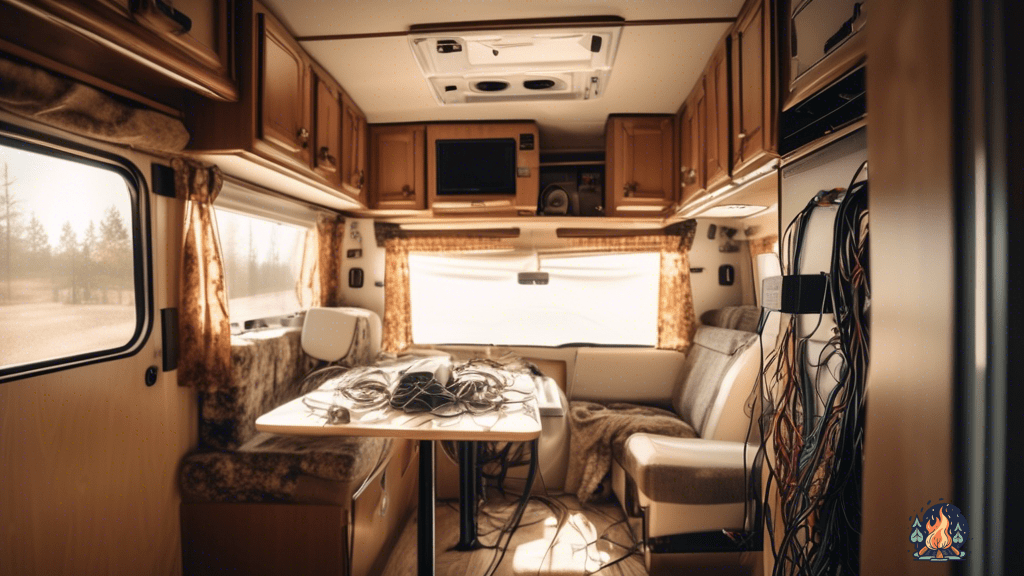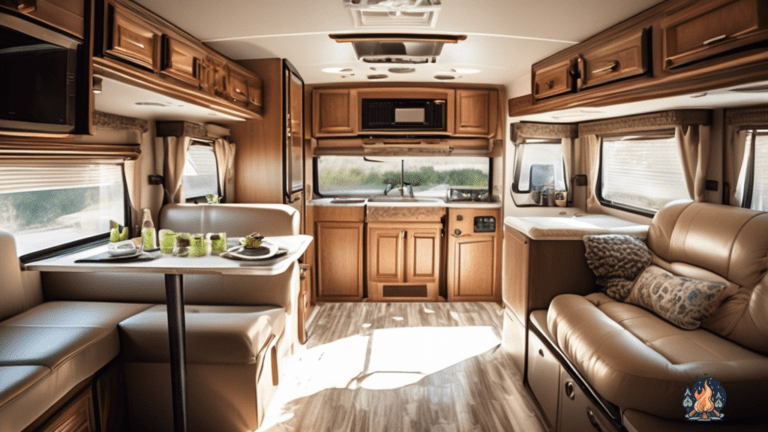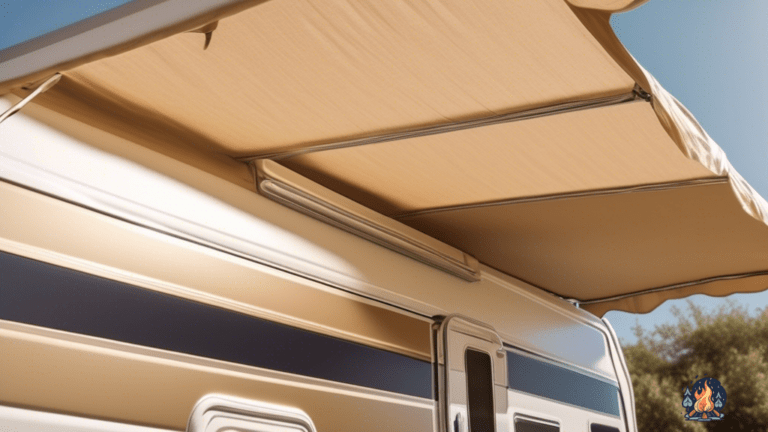Common Issues With RV Electrical Systems And How To Troubleshoot
by Kevin Fairbanks • Updated: January 21, 2024
Feeling powerless in your RV due to electrical problems? Learn the common issues and troubleshoot your RV electrical system now! Get back on track for your adventure by clicking here.

Are you ready to hit the open road in your trusty RV? Before you embark on your next adventure, it’s important to ensure that your RV’s electrical system is in top-notch condition. After all, who wants to deal with pesky electrical issues while trying to enjoy the great outdoors?
In this article, we will explore the common issues that can arise with RV electrical systems and provide you with some humorous and helpful troubleshooting tips to get you back on track.
Picture this: you’re sitting around the campfire, telling ghost stories and roasting marshmallows, when suddenly, the lights in your RV flicker and fade. Cue the dramatic gasps and nervous laughter. But fear not, intrepid traveler, for you are equipped with the knowledge to tackle these electrical mishaps head-on.
We will discuss everything from faulty connections to power surges, and provide you with step-by-step instructions on how to troubleshoot these issues. So, grab your sense of adventure and let’s dive into the world of RV electrical systems. It’s time to get your sparks flying and your RV rolling smoothly down the road!
Understanding RV Electrical Systems
So, you’ve got your RV ready for your next adventure, but do you really understand how the electrical system works? Don’t worry, you’re not alone in this confusing world of currents and circuits.
RV electrical systems can be quite complex, but fear not, for I am here to guide you through this electrifying journey with a touch of humor.
Let’s start with the basics. Your RV electrical system consists of two main components: the 12-volt DC system and the 120-volt AC system. The 12-volt DC system powers your RV’s lights, water pump, and other small appliances, while the 120-volt AC system powers larger appliances like the air conditioner and microwave. It’s like having a small-scale version of your home’s electrical system, except on wheels.
Now, here’s where things get a bit tricky. Your RV can be powered by either shore power, which is when you plug into a campground’s electrical pedestal, or by your RV’s onboard generator.
When you’re plugged into shore power, your RV’s electrical system is connected to the campground’s electrical grid, and you can use all of your appliances just like you would at home. But when you’re running on your generator, you’re essentially creating your own power source, which means you need to be mindful of your energy usage to avoid draining your battery.
So, there you have it – a crash course in understanding RV electrical systems. Remember, stay connected to shore power whenever possible, be mindful of your energy usage, and always double-check your connections.
With these tips in mind, you’ll be ready to tackle any electrical issue that comes your way.
Happy camping!
Identifying Common Electrical Issues
To effectively identify electrical problems in an RV, it’s crucial to have a good understanding of the various components and their functions. Trust me, you don’t want to be the person standing there scratching your head while your RV is as powerless as a goldfish in a bowl.
So, let’s get to it!
One common issue you might encounter is a blown fuse. Now, I know what you’re thinking, "Who needs fuses when you have the power of the universe running through your RV?" Well, my friend, even the universe needs a little protection sometimes. Fuses are like the bodyguards of your electrical system, and when they blow, it’s their way of saying, "I’ve taken one for the team!" So, if you find yourself in a dark RV, start by checking the fuses. Trust me, they’ll appreciate the attention.
Another pesky problem you might face is a faulty circuit breaker. Now, I’m not talking about the kind of breaker that leaves you dancing alone in the middle of the RV park (although, that could be fun too). I’m talking about the ones that protect your electrical system from overloading and causing a fire. These little guys are like the superheroes of your RV, swooping in to save the day when things get a little too hot. But sometimes, even superheroes need a break. So if your power suddenly goes out, don’t panic! Just head to your circuit breaker panel and see if any of them have tripped. It’s like a game of hide-and-seek, but instead of finding your keys, you’re finding the key to restoring power to your RV. Trust me, it’s a lot more exciting than it sounds!
Troubleshooting Tips for RV Electrical Problems
When troubleshooting electrical problems in an RV, it’s important to start by checking the fuse box. This might seem like an obvious step, but you’d be surprised how many people overlook it.
So, grab your trusty screwdriver and pop open that fuse box. Now, take a good look at the fuses. Are any of them blown? If so, replace them with new ones. And hey, if you’re feeling extra fancy, you can even label the fuses so you know exactly what each one is for. Just be careful not to mix up the labels, unless you want to play a fun game of "Guess Which Fuse Controls the Lights" every time you need to turn on a lamp.
Once you’ve checked the fuse box, it’s time to move on to the next step: checking the circuit breakers. These little guys are like the superheroes of your RV’s electrical system. They’re designed to protect your circuits from overloads and short circuits. So, if you’re experiencing electrical issues, there’s a chance that one of these bad boys has tripped. Don’t worry, it’s an easy fix.
Just locate the circuit breaker panel (usually near the fuse box) and look for any breakers that are in the "off" position. Simply flip them back to "on" and voila! Your electrical problems might just disappear faster than a magician’s rabbit.
Preventive Maintenance for a Reliable Electrical System
Regular maintenance is essential for ensuring the reliability of your RV’s electrical system. Just like with any other aspect of your RV, taking the time to perform preventive maintenance can help you avoid future problems and keep your electrical system running smoothly.
So, let’s dive into some tips to keep your RV’s electrical system in tip-top shape!
First and foremost, make sure to check your batteries regularly. It’s a good idea to clean the battery terminals and make sure they’re secure. You don’t want your batteries wiggling around while you’re on the road! Additionally, keep an eye on the water levels in your batteries and top them off as needed. Trust me, you don’t want to be stranded with a dead battery in the middle of nowhere.
Next, give your electrical connections some love. Check for any loose or corroded connections and tighten them up or clean them off if necessary. It’s amazing how much better things work when they’re properly connected! And don’t forget to inspect your wiring for any signs of damage or wear. A little bit of electrical tape can go a long way in preventing a potential disaster.
Taking the time to perform preventive maintenance on your RV’s electrical system will not only help you avoid future headaches, but it can also save you money in the long run. Plus, it gives you an excuse to tinker around with your RV and feel like a true handyman or handywoman.
So, grab your toolbox and get to work! Your electrical system will thank you.
Seeking Professional Help: When to Call an Electrician
If you’re at your wit’s end with your RV’s electrical problems, it may be time to bring in a professional sparky to save the day. Look, we get it. You’ve tried everything from jiggling wires to crossing your fingers and chanting a little electrical mantra.
But sometimes, you just need to admit defeat and call for reinforcements. And who better to call than an electrician? These magical beings have spent years honing their craft and have the power to make your electrical woes disappear faster than a magician pulling a rabbit out of a hat.
So, put down the wire cutters and pick up the phone. It’s time to bring in the big guns.
Now, you might be wondering, when exactly should you call an electrician? Well, if you’re experiencing issues like flickering lights, outlets that don’t work, or mysterious sparks flying out of your electrical panel, it’s probably a good time to make that call. Unless you’re a certified electrician yourself (and if you are, why are you reading this?), it’s best to leave these complicated electrical problems to the experts.
Trust us, they’ve seen it all. From miswired circuits to fried wiring, these electricians have the skills and knowledge to diagnose the issue and get your RV’s electrical system back on track.
So, instead of resorting to questionable DIY solutions involving duct tape and chewing gum, do yourself a favor and call in the professionals. Your RV and your sanity will thank you.
Frequently Asked Questions
How can I prevent electrical issues in my RV water heater?
To prevent electrical issues in your RV water heater, make sure to regularly inspect and clean the connections. Don’t overload the circuit and consider using surge protectors. And remember, if your water starts boiling, it’s not a hot tub! Stay safe and keep your RV cozy.
What are some warning signs of a faulty RV converter?
Are you tired of your RV converter acting up? Look out for warning signs like flickering lights, strange noises, or appliances not working properly. Don’t let a faulty converter ruin your road trip, get it fixed ASAP!
Are there any specific safety precautions I should take when working on my RV’s electrical system?
When working on your RV’s electrical system, safety is crucial. Always disconnect the power source and wear protective gear to avoid accidents. Remember, taking proper precautions will ensure both your safety and the smooth functioning of your RV.
How often should I replace my RV’s batteries?
When it comes to replacing your RV’s batteries, it’s not like changing your socks every day. But hey, if you notice decreased performance or they’re just not holding a charge, it’s time for a new pair!
Can I use a regular household extension cord to power my RV?
Sure, you can use a regular household extension cord to power your RV, but don’t expect the same results as using a proper RV cord. It’s like using a toothpick to build a skyscraper – not the best idea, my friend!

Hi, I’m Kevin, a lifelong camping enthusiast and the voice behind Campfire Discoveries. From tent to RV to cabin camping, I’ve explored it all. Join me as we share stories and tips around the campfire, deepening our connection with the great outdoors.
Keep Reading
-
Common Issues With RV Propane Systems And How To Troubleshoot
Learn how to troubleshoot common issues with RV propane systems like a pro and ensure a smooth adventure. Don’t let propane problems hold you back – click now for expert tips!
-
How To Repair Your RV Awning
Don’t let a damaged RV awning spoil your next adventure! Discover the easy steps to repair your RV awning and get back to enjoying the great outdoors. Click now for expert tips on RV awning repair and start planning your next trip today!
-
Tips for Camping in Comfort
Discover the ultimate guide to camping in comfort. Make your camping trip experience more comfortable with our top tips and gear recommendations.



